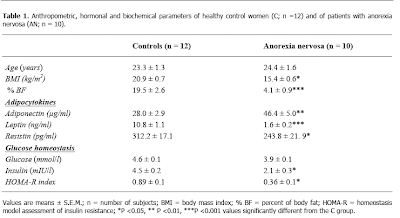Hyperinsulinemia and Anorexia?
In the course of a discussion over at Jimmy Moore's forum I came across something I did not know. Anorexics -- the thinnest among us! -- can also become hyperinsulinemic!!!! How can that be??
If it's all about the insulin causing fat accumulation, one would think this condition would result in any dietary intake getting trapped in the fat tissues, making it unavailable to the anorexic for fat-burning, resulting in voracious hunger.
But we would expect the anorexic to have very low postprandially-induced insulin levels. No matter what they eat, they don't eat much. So, where is this insulin coming from?
It would seem to be, yet again, a defense mechanism of our bodies. I've come across quite a bit of contradictory observations on this.
For example, in this article, anorexics had lower postprandial insulin responses and higher metabolic rates of insulin clearance and describe anorexia as being associated with improved insulin sensitivity. They also have decreased basal insulin levels. The authors propose this is an adaptive mechanism to protect the anorexic from hypoglycemia. Here is another article describing improved insulin sensitivity in anorexia. The hormonal levels from that study are shown below.
However searching on hyperinsulinemia and anorexia yields some interesting hits:
A brief review is made of the role of insulin in satiety and in the control of body weight, and of the newly available techniques to accurately quantify secretion, hepatic extraction, and post-hepatic delivery rates of insulin. Neural, metabolic, and endocrine stimuli affect insulin secretion. The hypothesis is therefore compatible with several etiologic factors leading to hyperinsulinemia in anorexia nervosa and major depression, and resulting in decreased food intake and weight loss.There's also this case study (can't find anything of this paper)
How does the hyperinsulinemia develop? Usually it's from insulin resistance, and IR would seem to be a reasonable physiological adaptation to starvation -- so as to preserve glucose for the tissues that need it most. Elevated cortisol that is associated with anorexia could be the cause. Perhaps the changes in insulin sensitivity are time/progression dependent, with one occurring early on, the other developing later?
Still, it is interesting that the elevated insulin is associated with further REDUCED intake, not vice versa.

Comments
i would think the anorexic is insulin resistant just notin the same way an obese person is...one is physically IR and the other is physiologically IR
I also think that's why sugar water is probably the most healing thing to rehabilitate starving persons, enabling increased liver glycogen storage.
@Matt: This is an important concept to understand, especially that insulin is an appetite-suppressing hormone, and being resistant to it causes hunger - not how many low-carb authors would have you believe.
LOL, I've posted many times in discussion forums that insulin's physiological role is to suppress appetite. It's so common-sensical (why would a hormone secreted in response to feeding stimulate appetite??), yet so many refuse to believe this no matter the evidence offered up in support.
The notion that postprandial insulin is the cause of chronic basal hyperinsulinemia in the obese is wrong headed.
1996!!
Starvation diet and very-low-calorie diets may induce insulin resistance and overt diabetes mellitus.
Koffler M, Kisch ES.
Diabetes Unit, Tel-Aviv University Medical Center, Ichilov Hospital, Israel.
http://www.ncbi.nlm.nih.gov/pubmed/8777329
Excellent POST. btw if any obtains the PDF, could you forward to me?? THANXXX.
>> .. resistant to it causes hunger
Is this proven? All I've seen to date is "resistance" as a general term, and mostly applied to muscle, liver and adipose tissue.
I've seen nothing about the brain's resistance and find extrapolations from liver/muscle/adipocytes iffy.
And even if insulin resistant people are hungrier I would still be concerned it's an associated phenomenon, not necessarily causative.
Adrenal glucocorticoid and androgen precursor secretion are dissociated in anorexia nervosa, with relative hypercortisolemia and a preservation of DHEA secretion. Reduced DHEA response to cosyntropin in women receiving OCPs is attributable to decreased albumin levels. In the setting of relative hypercortisolemia, reduced adrenal androgen precursor secretion is not a mechanism underlying low testosterone levels in anorexia nervosa.
prolly have something to do with insulin regulation
if only i could self produce the studies i want to see haha
The world is full of special forces soldiers, olympic athletes, wannabe-obscure-world-record-setters, etc... who have the psychological willpower to do uncomfortable things in order to accomplish a goal. So why are we surprised about anorexics?
Here is my homepage ... fuji mini mite 3 hvlp ()
Post a Comment
Comment Moderation is ON ... I will NOT be routinely reviewing or publishing comments at this time..